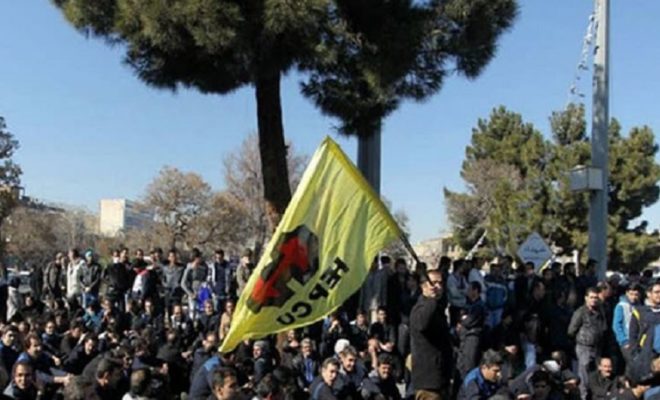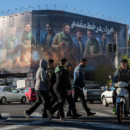Iran Recruits Child Soldiers – Again
2 May 2016
The Iranian government is broadcasting a music video made by the Basij militia recruiting children to fight in Syria’s civil war.
 The original is in Persian (Farsi), but the National Council of Resistance of Iran (NCRI) translated some of the lyrics.
The original is in Persian (Farsi), but the National Council of Resistance of Iran (NCRI) translated some of the lyrics.
“On my leader [Ayatollah Khamenei’s] orders I am ready to give my life.
The goal is not just to free Iraq and Syria;
My path is through the sacred shrine [in Syria], but my goal is to reach Jerusalem.
… I don’t regret parting from my country;
In this just path I am wearing my martyrdom shroud.”
Iran’s regime has done this before. During the Iran-Iraq War, which killed around a million people between 1980 and 1988, the Basij recruited thousands of children to clear minefields.
After lengthy cult-like brainwashing sessions, the poor kids placed plastic keys around their necks, symbolizing martyrs’ permission to enter paradise, and ran ahead of Iranian ground troops and tanks to remove Iraqi mines by detonating them with their feet and blowing their small bodies to pieces.
Children have been fighting in wars as long as there have been wars, but shoving them into the meat grinder in the 21st century is a war crime expressly prohibited and sometimes even punished by all civilized governments. The International Criminal Court in The Hague, for instance, convicted Congolese warlord Thomas Lubanga Dyilo of war crimes in 2012 for “conscripting and enlisting children under the age of fifteen years and using them to participate actively in hostilities.”
The Basij is a paramilitary branch of the Iranian Revolutionary Guard Corps, or Pasdaran, and it’s commanded by the iron-fisted head of state, Supreme Leader Ali Khamenei. It’s mostly used for internal repression and provided many of the shock troops who brutally suppressed non-violent demonstrations during the Green Revolution in 2009.
“Parallel institutions” (nahad-e movazi) is how Iranians refer to the quasi-official organs of repression that have become increasingly open in crushing student protests,” writes Human Rights Watch, “detaining activists, writers, and journalists in secret prisons, and threatening pro-democracy speakers and audiences at public events. These groups have carried out brutal assaults against students, writers, and reformist politicians, and have set up arbitrary checkpoints around Tehran. Groups such as Ansar-e Hizbollah and the Basij work under the control of the Office of the Supreme Leader, and there are many reports that the uniformed police are often afraid to directly confront these plainclothes agents. Illegal prisons, which are outside of the oversight of the National Prisons Office, are sites where political prisoners are abused, intimidated, and tortured with impunity.”
The Basij is also known, ludicrously I should add, as the Organization for Mobilization of the Oppressed. These people are superpredators. They attack unarmed civilians with knives, motorcycle chains and axes. They rape young women and boys. They have raped and murdered women who don’t adhere to strict Islamic dress codes.
If these people behaved this way in most parts of America, they’d be tried for capital murder and executed, but they’re above the law in Iran, answering only to the Supreme Leader, and now that they’re recruiting children again, it’s becoming increasingly difficult to differentiate them from ISIS.
“Deception of children by the mullahs and demagogy such as reaching Jerusalem via Aleppo point to two realities,” Shahin Gobadi, who’s on the Foreign Affairs Committee of the NCRI said to me in an email through an intermediary. “First, despite deploying more than 60,000 forces from the IRGC, foreign mercenaries, and even its regular army, the clerical regime is facing a complete deadlock in Syria. Its forces have sustained heavy casualties in Syria and as such are totally demoralized. For instance, at least 40 IRGC generals have been killed there. In order to fill this vacuum, the regime has resorted to deceiving children to be dispatched to the war fronts. This is what it used to do during the Iran-Iraq war, but it ultimately failed miserably.
“Second,” he continued, “the war in Syria and keeping the dictator Bashar Assad in power is so crucial for the Iranian regime’s supreme leader Ali Khamenei that he is willing to pay any price for this objective. In February in a meeting with the families of the regime’s forces who were killed in Syria, Khamenei said that if we did not fight in Syria, we would have had to fight with our opposition in major Iranian cities. Resorting to the tactic of mobilizing teenagers only leads to one conclusion, the mullahs are facing a deadly impasse in Syria.”
The Iranian government desperately needs the Assad regime in Damascus and the Abadi government in Iraq because they’re Iran’s only allies in the entire Arab world. A moderate and democratic Iran would have no trouble forging normal and friendly relations with moderate Arabs governments like Jordan’s, Tunisia’s, Morocco’s and possibly even Egypt’s, but the revolutionary state that’s been entrenched there since 1979 isn’t tolerated any better in capitals like Cairo and Riyadh than it is in Tel Aviv and Jerusalem.
By cutting deals with the Iranian government, the United States is increasingly out of step with the region, but if the Basij actually sends children into battle in Iraq and Syria—where ISIS crucifies and beheads its enemies and detests no one on earth as much as Iranian Persians and Shias—it’s going to be harder for Washington officials to explain themselves without going red in the face than it has been in a while.







